Hawaii State Legislature are cherry picking Civil Rights issues. NON-Judicial Foreclosure Bills to seize private property WITHOUT going to court are speeding through.
In 2022, Honolulu Mayor Rick Blangiardi requested the State Legislature for Non-Judicial Foreclosure (Power of Sale), based on civil fines. HB1434 would allow its Department of Planning and Permitting (DPP) to sell private property, WITHOUT going to court.
Counties would become the Police, Prosecutor, Jury, Judge, and Executioner. Property owners would be striped of basic constitutional civil rights and denied judicial due process. Fortunately, HB1434 died.
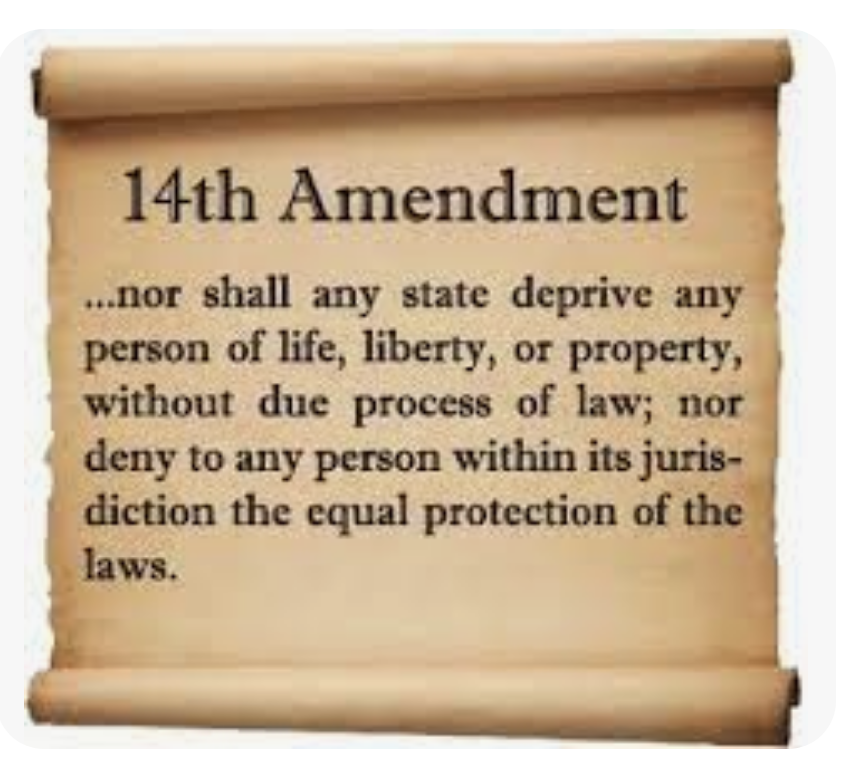
In 2023, Blangiardi requested the same Power of Sale in HB106 with its companion Bill SB216. This year, there are at least four (4) more clone bills with the same agenda.
The following bills are sailing through, with little public awareness:
SB 875 Introduced by Senators Stanley Chang, Donovan Dela Cruz, and Sharon Moriwaki
HB 15 Introduced by Representative David Tarnas
HB 538 with similar features is introduced by House Representatives: Scot Z. Matayoshi, Della Au Belatti, Troy Hashimoto, Daniel Holt, Daris Kila, Lisa Kitigawa, Rachelle Lamosao, Lisa Marten, Scott Y. Nishimoto, Jenna Takenouchi, David Tarnas, Cory M. Chun
Before we move on, let’s pause to put the US Constitution in this conversation about excessive Civil fines:

The late Justice Ruth Bader Ginsburg said it best in one of her last Opinions for the US Supreme Court in Timbs vs Indiana relating to excessive civil fines:
“This Court has held that the Fourteenth Amendment’s Due Process Clause incorporates the protections contained in the Bill of Rights, rendering them applicable to the States.”
“ For good reason, the protection against excessive fines has been a constant shield throughout Anglo-American history: Exorbitant tolls undermine other constitutional liberties. Excessive fines can be used, for example, to retaliate against or chill the speech of political enemies, as the Stuarts’ critics learned several centuries ago.”
” Protection against excessive fines has been a constant shield throughout Anglo-American history for good reason: Such fines undermine other liberties. They can be used, e.g., to retaliate against or chill the speech of political enemies. They can also be employed, not in service of penal purposes, but as a source of revenue. The historical and logical case for concluding that the Fourteenth Amendment incorporates the Excessive Fines Clause is indeed overwhelming.”
“Even absent a political motive, fines may be employed “in a measure out of
accord with the penal goals of retribution and deterrence,” for “fines are a
source of revenue,”
” In short, the historical and logical case for concluding that the Fourteenth Amendment incorporates the Excessive Fines Clause is overwhelming. Protection against excessive punitive economic sanctions secured by the Clause is, to repeat, both “fundamental to our scheme of ordered liberty” and “deeply rooted in this Nation’s history and tradition.”
Who is responsible to inform the public about these Bills?
It’s common knowledge that residents cannot actively participate in these fast-paced proceedings held during working hours.
Generally those who bird-dog the sessions are from within the governmental bureaucracy, politicians, non-profit group personnel, trade industry, lobbyists, some independent groups and grassroots community advocates.
Google Searches show no County Mayors, Council members, or State Legislators apprising these monumental and far-reaching Power of Sale Bills in the public square.
On one hand, recent indictments of two state legislators and county officials have brought increased calls for a more open and transparent and accountable government.
Thanks to Civil Beat and others, there is a concerted media exposure on the so-called “SUNSHINE BILLS” to promote more accountability this legislative session.
On the other hand, these five non-judicial foreclosure bills are the best-kept secrets in town. These bills significantly disenfranchise and undermine the basic civil rights of Hawaii’s private property owners.
Even the few legislators/aides that I talked with were initially unaware of these far-reaching bills.
Who are shepherding these Power of Sale bills?
There were five (5) Honolulu City Council members and former DPP Director Dean Uchida supporting the two (2) non-judicial foreclosure bills last year. But it’s down to one Honolulu council member this year.
Further tracking of these five (5) Power of Sale bills reveals third-year City Council member Calvin Say and newly-appointed Honolulu DPP Director Dawn Takeuchi Apuna .
There is no participation from other counties although these bills will affect all of Hawaii.
What are the Justifications for these bills?
The written testimonies from City Councilmember Calvin Say and DPP Director Dawn Takeuchi Apana reflect troublesome “Straw Man Argument” — creating hasty and broad generalizations of a few egregious private owners to justify the request for an over-reaching non-judicial Power of Sale.
City Council man Calvin Say:
“Our City Corporation Counsel is currently able to initiate a Judicial Foreclosure process, which has been successful in similar instances, however this is a long process that takes valuable resources away from other pressing legal matters.
SB 875 would allow the City to keep our neighborhoods safe by stopping illegal activities, health hazards, and other public nuisances on properties in a more efficient and expeditious manner. “
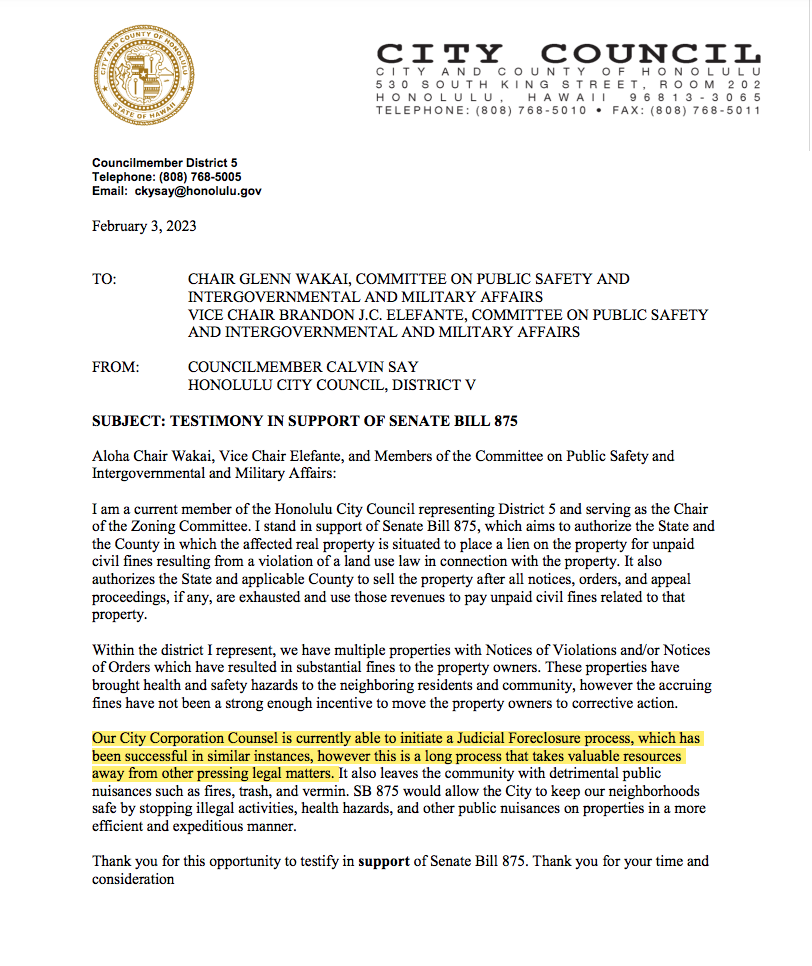
Recently-appointed DPP Director DawnTakeuchi Apuna further reinforces the justification that their existing powers that the city has to ” pursue a judicial foreclosure, which is a lengthy and costly process. This measure will provide the counties with a more viable, efficient, and effective method to collect liens on properties for civil fines.“
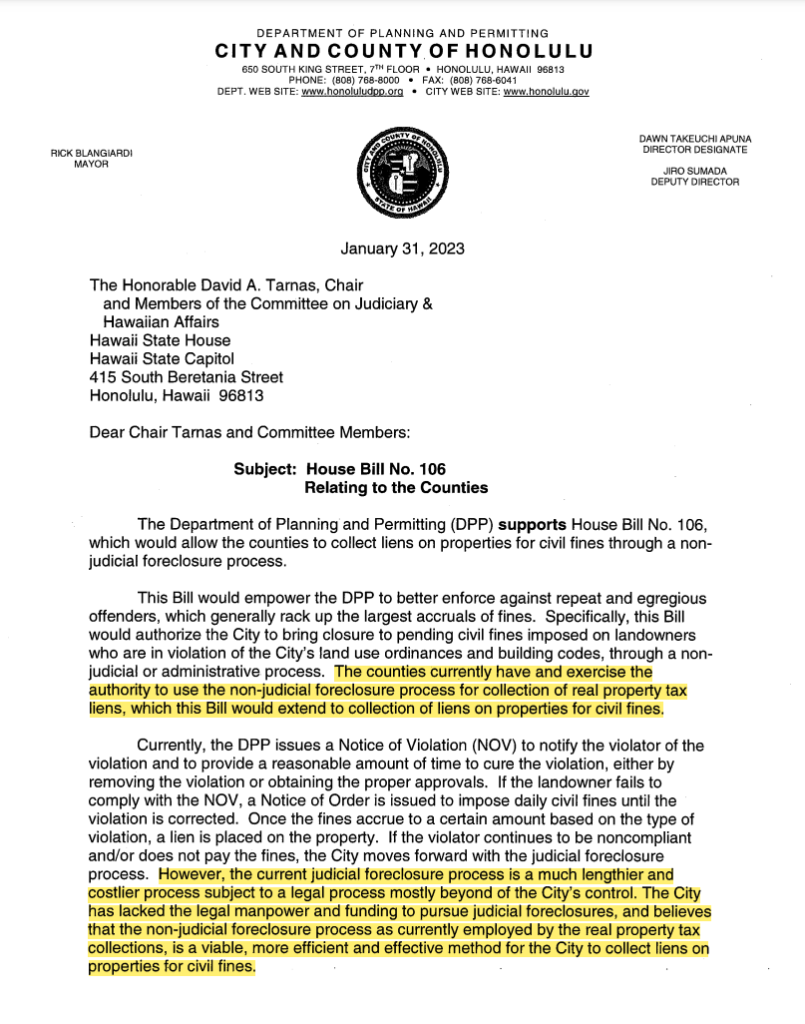
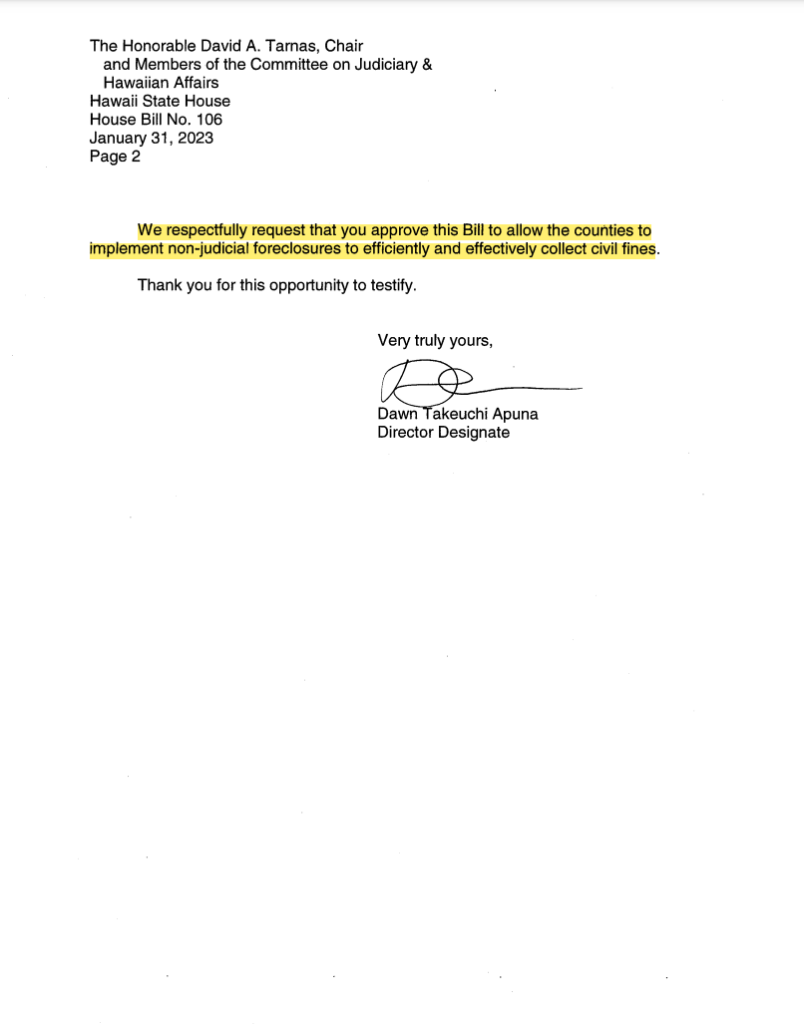
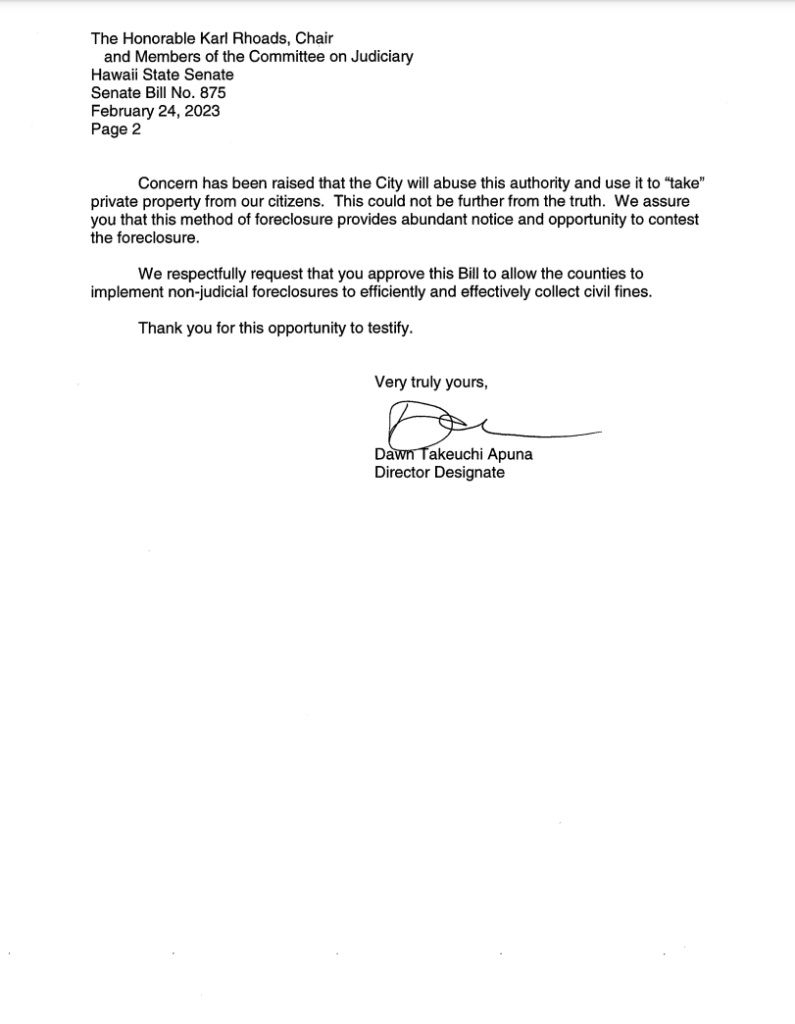
In a nutshell, the Honolulu county is saying that its existing tools in its toolbox are too slow and too much work.
These county testimonies also do not disclose the city’s other tools to enforce “problem properties” including the police, Department of Health, and a long list of other bureaucratic resources to manage and implement municipal affairs and enforcement.
Is DPP always Right and the Public always wrong?
Could the Honolulu County be hoping for a new windfall and income revenues through fines? Like any issues, there are always two sides to a story no matter how thin the cheese is sliced.
What is behind the story of this 5,000 square feet residential lot in Kalihi Heights? It has accrued $15.8 million in civil fines for “overgrown weeds”.
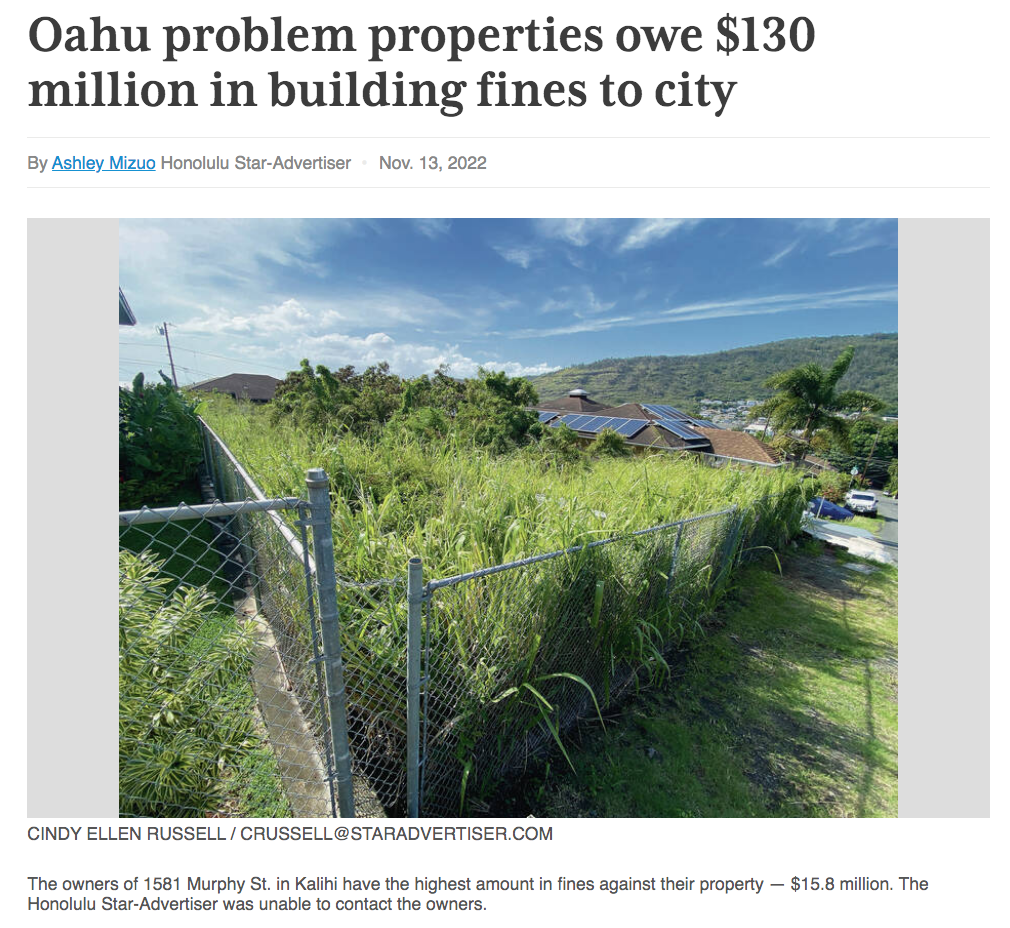
The written testimonies do not disclose that while they want “more efficient and expeditious manner”, DPP is struggling with permit processing delays, mismanagement, corruption culture and so forth. It would be unjust to expect residents to cure their violations in a more efficient and expeditious manner when their permits to correct violations are cancelled, lost or delayed. It becomes a Catch-22 for the owners.
The Legislature assumes that DPP is always right and the Public is always wrong.
There is also no acknowledgement that the Department of Planning and Permitting (DPP) has systemic mismanagement and corruption challenges. Even its own workers are saying that DPP needs to be overhauled and “fixed”. Many are carrying overload capacity with minimum support. They feel they’re being politically weaponized.
Residents with violations have complained that they were not even aware of the fines that DPP imposed on their property. Some maintain that DPP imposed wrong violations on them. Some say they could never get their calls returned. An ailing owner said he called the city about their fines and the answer given to him was he could “quitclaim their property to the city” to solve his problem. One complained that a kupuna was told to remove their small handicap ramp in front of their small Hicks home but they knew of other big homes who were given a pass. Some complained about lost permits. These are just the small mom-and-pop complaints. Nothing is written about comments from the professional building and construction industry.
There is no compassion or understanding that most Hawaii property owners sacrificed much to acquire their property for themselves and their families.
When a property is seized, where is the owner going to find a replacement property? How is seizing private properties helping local residents?
Shouldn’t the county be helping owners get into compliance rather than seizing properties?
Is this process for these bills adequate for good decision-making?
As I have mentioned, the few legislators/aides I spoke with initially were not aware of these bills.
To be fair, who can blame the State Legislators? 3,132 Bills are introduced within a period of a month or so.
Which legislator can humanly and intelligently deliberate on each bill in such a short time?
With these civil rights bills, should monumental public policies be adopted based on superficial and unvetted written testimonies by one very energetic third-year councilman and a newly-appointed DPP Director?
Should legislators simply defer to the Committee Chairs?
Should opposing views from the public have any standing in the decision-making?
Should significant bills usurping civil rights deserve at least more disclosure from the legislators and more public dialogue?


Note that City Council member Calvin Say template testimony remains the same at the various committee hearings.
Honolulu DPP Dawn Takeuchi Apuna’s written testimony was edited later to assure there will be no abuse. She misses the point that non-judicial power of sale is already abusing private property rights because the owners is denied Due Process from the judicial branch i.e. the courts. Giving the Counties the in-house role of Police, Prosecutor, Jury, Judge, and Executioner is already abusive.

Cut and Paste Committee Reports
Unfortunately, the various Committee Reports through the process will show great deference to City Council member Say and DPP Director Apuna. No one questioned them. These written testimonies are “cut and paste” onto their official records FOR ADOPTION.
Here is an example:
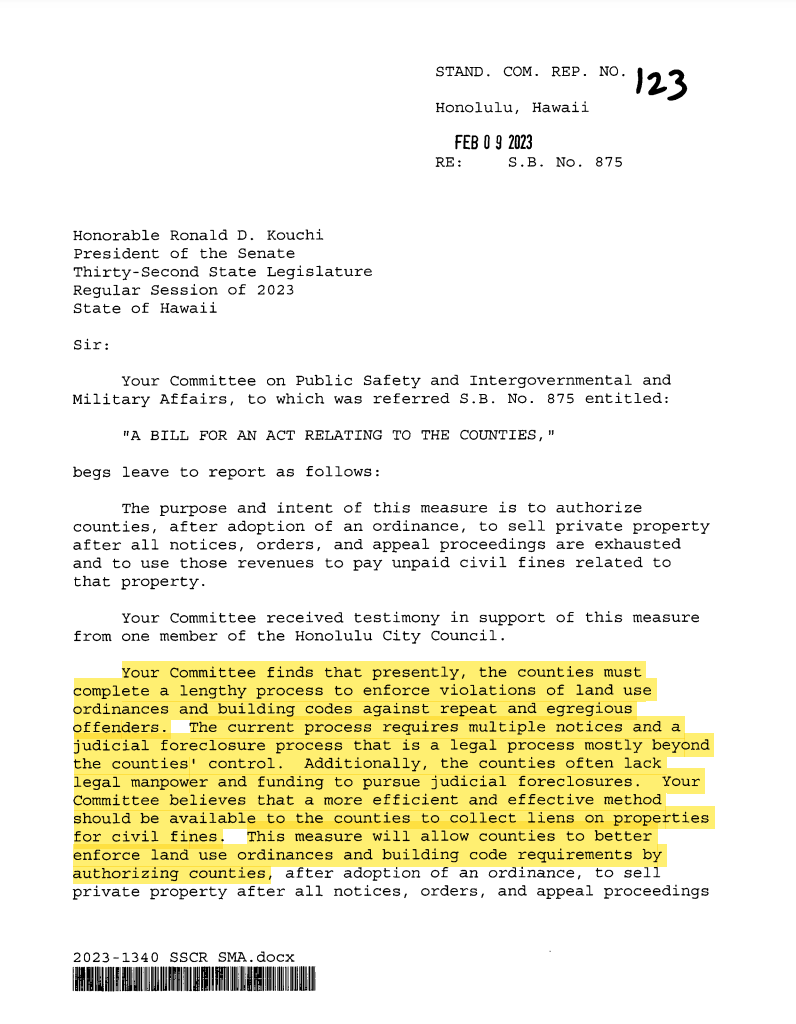
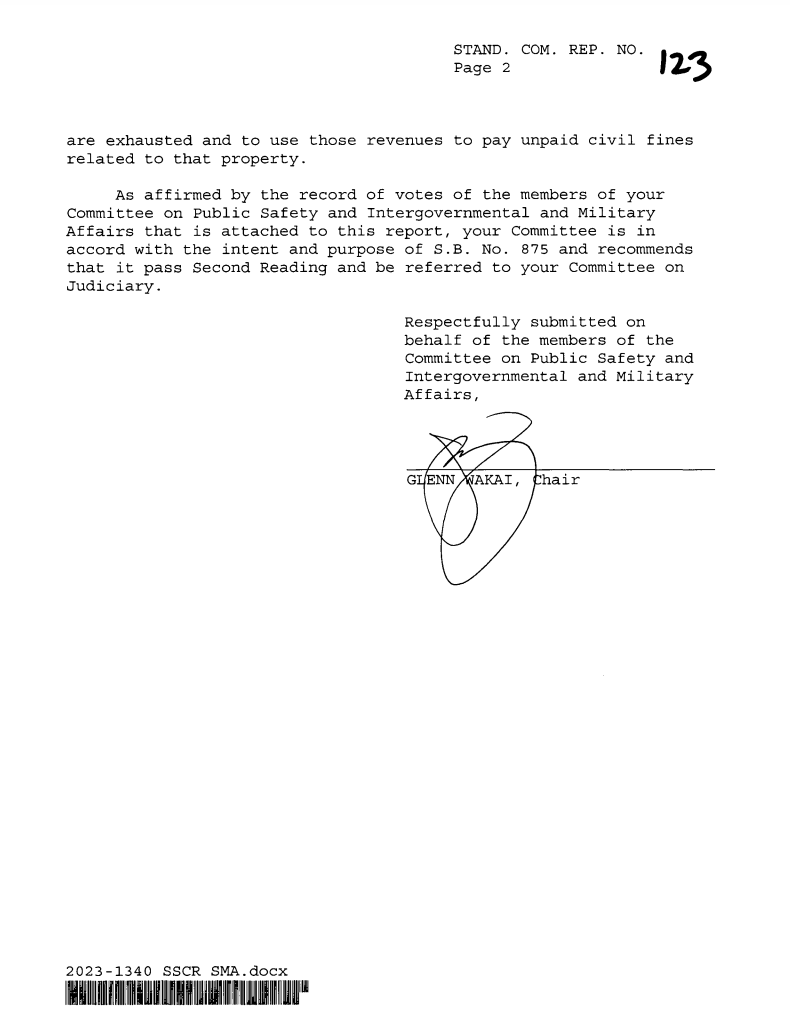
Here is the Committee Report form the Finance Committee:

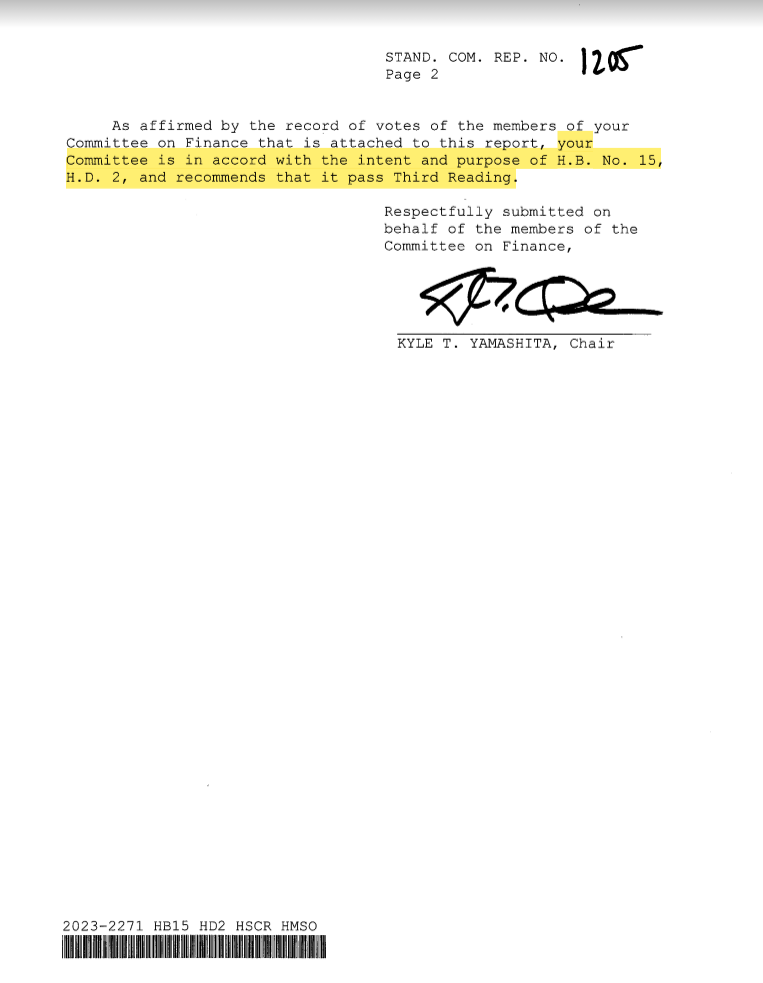
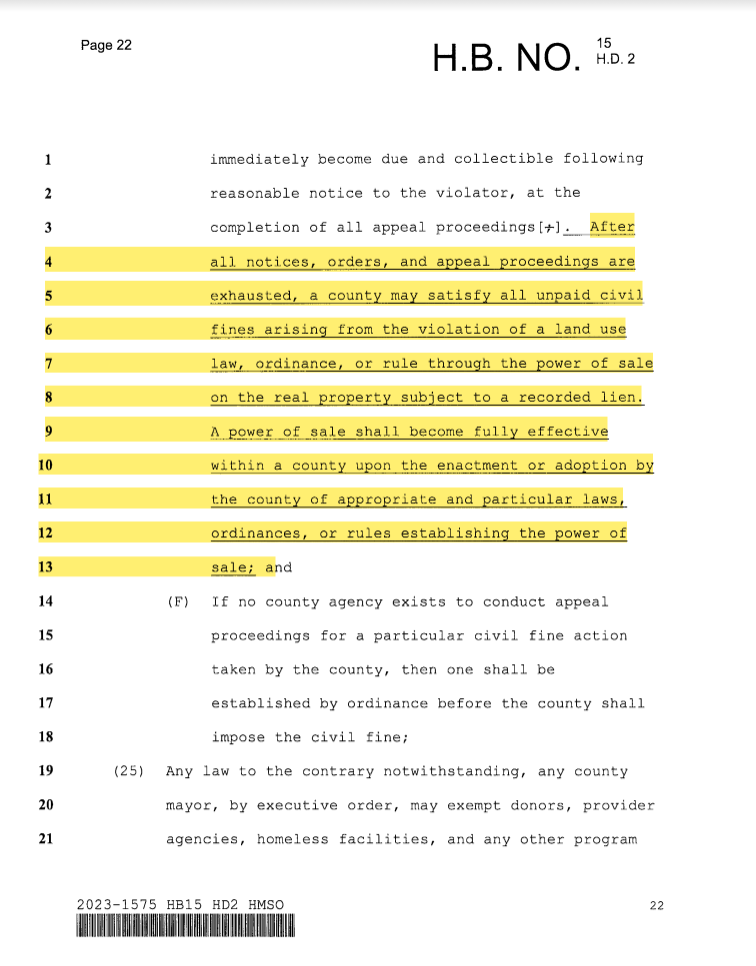
Here’s another cut and paste Committee Report based the written testimony from Council Say and DPP Director Apuna. Opposing testimonies are summarily dismissed.
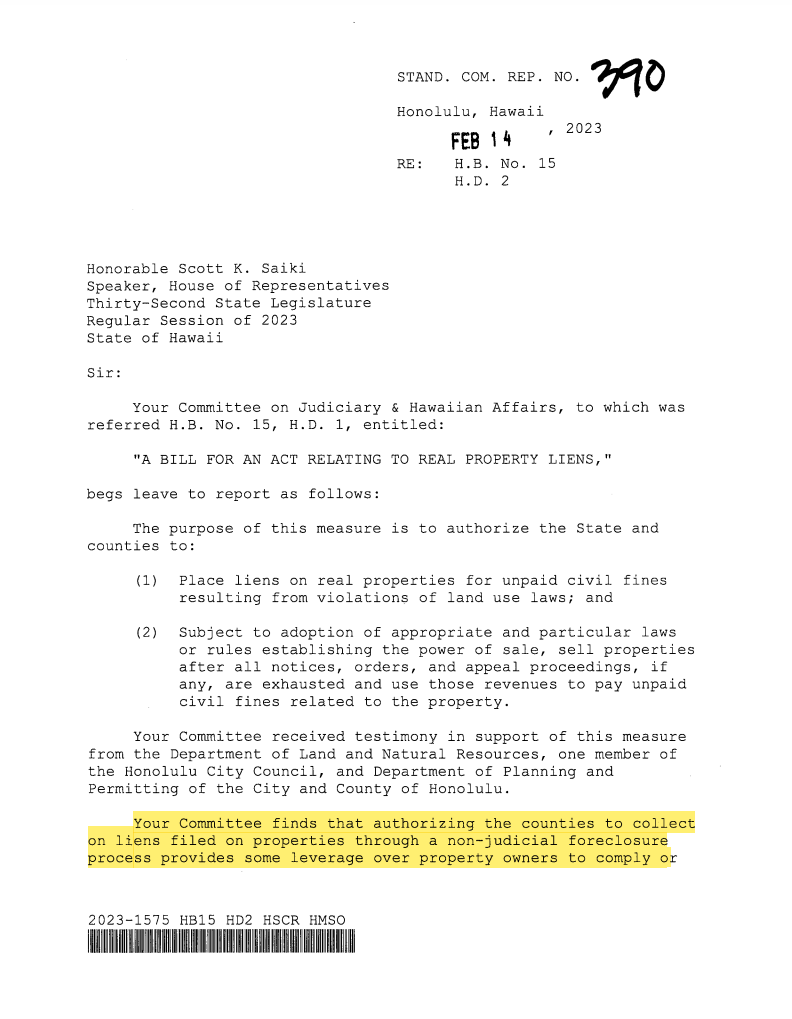
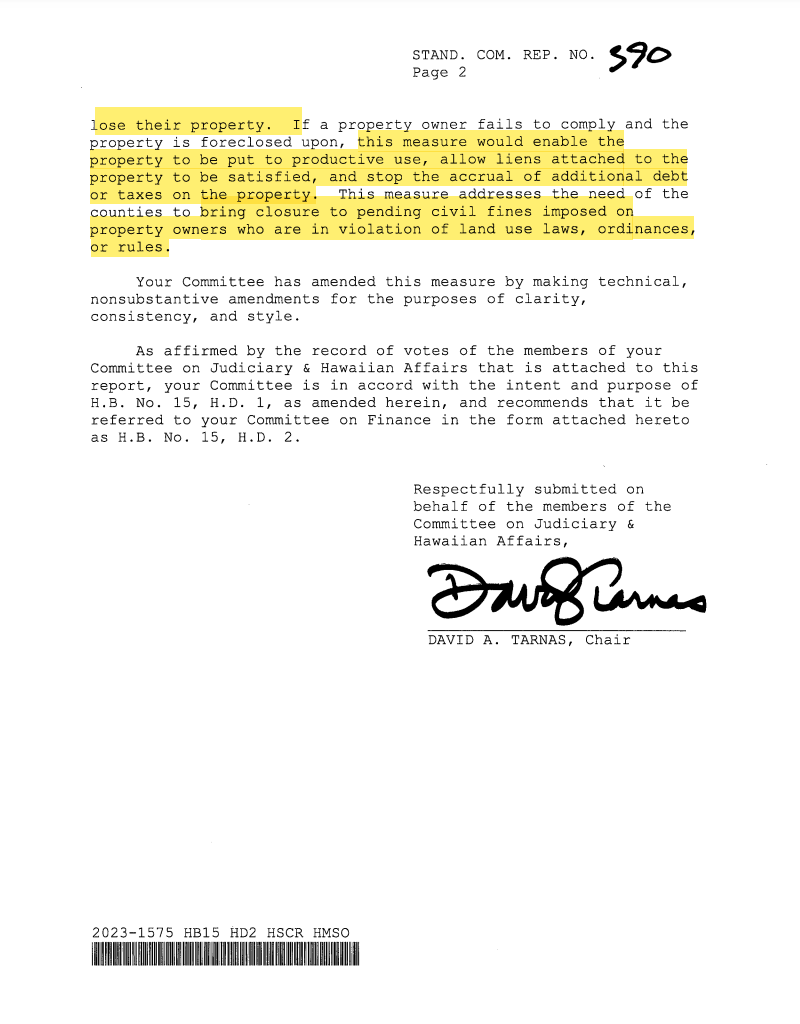
The Grassroot Institute of Hawaii’s written testimony plays right into the hand of the Senate Judicial Committee:
To add to the confusion, Grassroot Institute of Hawaii submitted concerns about possible abuse of power, recent corruption scandals, bribery, favoritism and corruption are commonplace, equity of resources, especially amongst older individuals, the most vulnerable would be most affected, and so on.
Unfortunately, Grassroots Institute of Hawaii offered a pending case Tyler vs Hennepin County, Minnesota that relates to property tax debts. However, these Power of Sale bills are about seized property based on county civil fines. Property Tax is not a civil fine .
Furthermore, the Grassroot Institute of Hawaii further committed harakiri on its own when it contradicted its own opposition to non-judicial seizure of private property:
” ; provided that the county sell the property at no less than the market value of similarly situated properties and that all revenues received from the sale that exceed the amount of the unpaid civil fines be refunded to the property owner.”
With supposed “freedom” fighters for liberty like this group, who needs enemies?
At issue is the non-constitutional of a private taking of a private property WITHOUT due process. The city becomes the Police, Prosecutor, Jury, Judge, and Executioner.
It’s not about the price or the balance of the forced power-of-sale.
Unfortunately, the State Senate Judiciary Committee Chair quickly adopted this language from the Grassroots Institute of Hawaii’s written testimony. Again, other opposing written testimonies were summarily dismissed. The language is highlighted in green for quick reading.
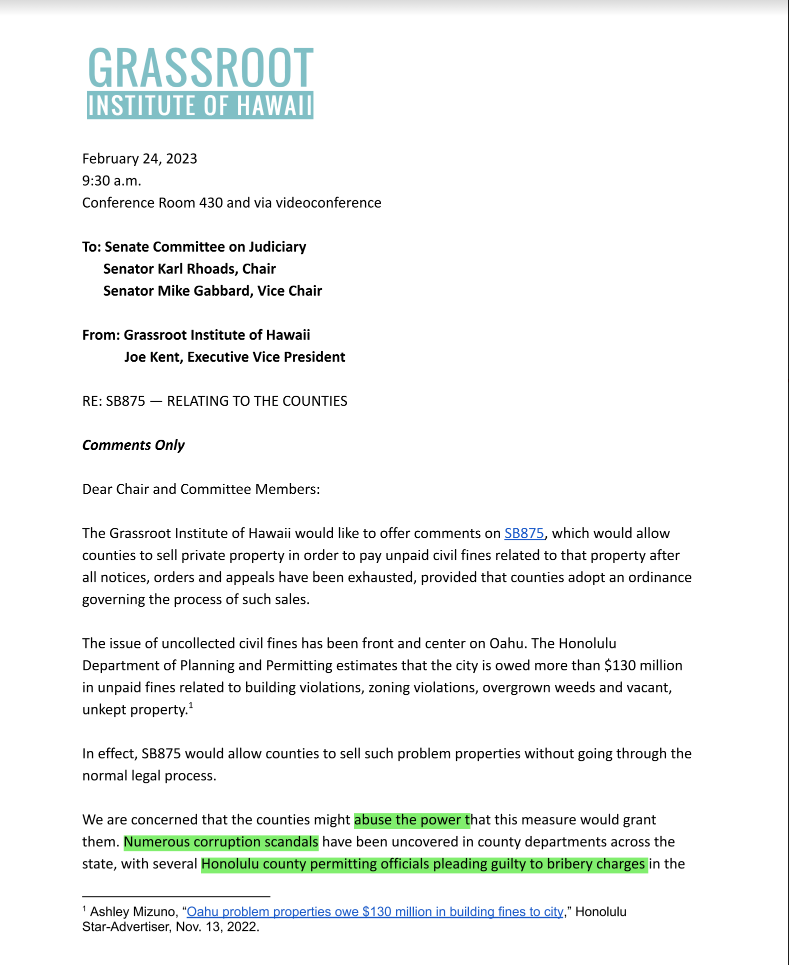
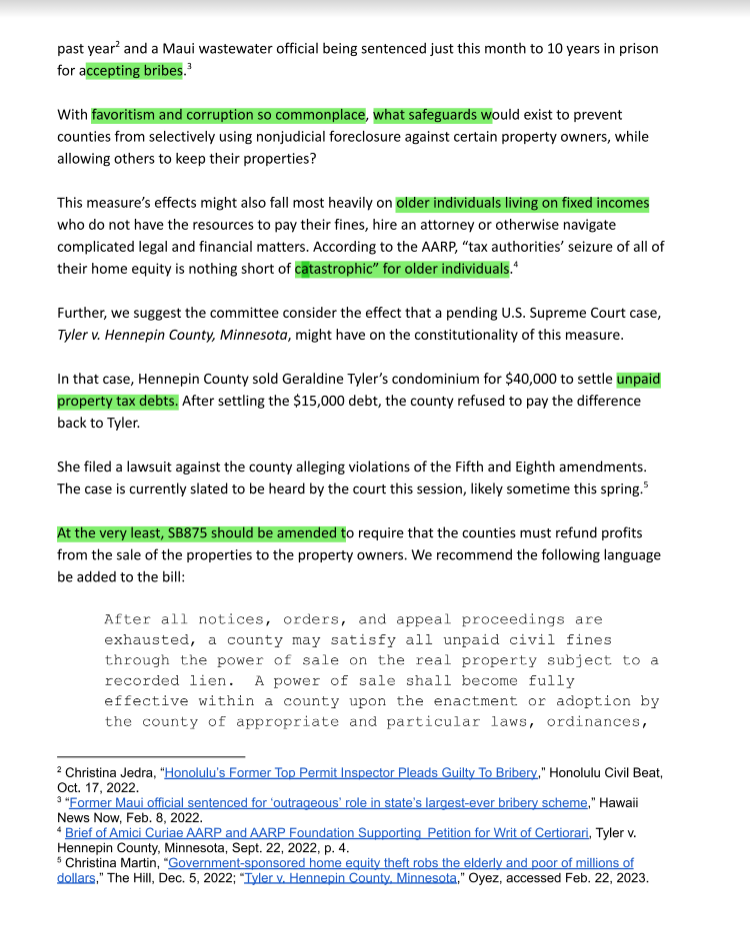
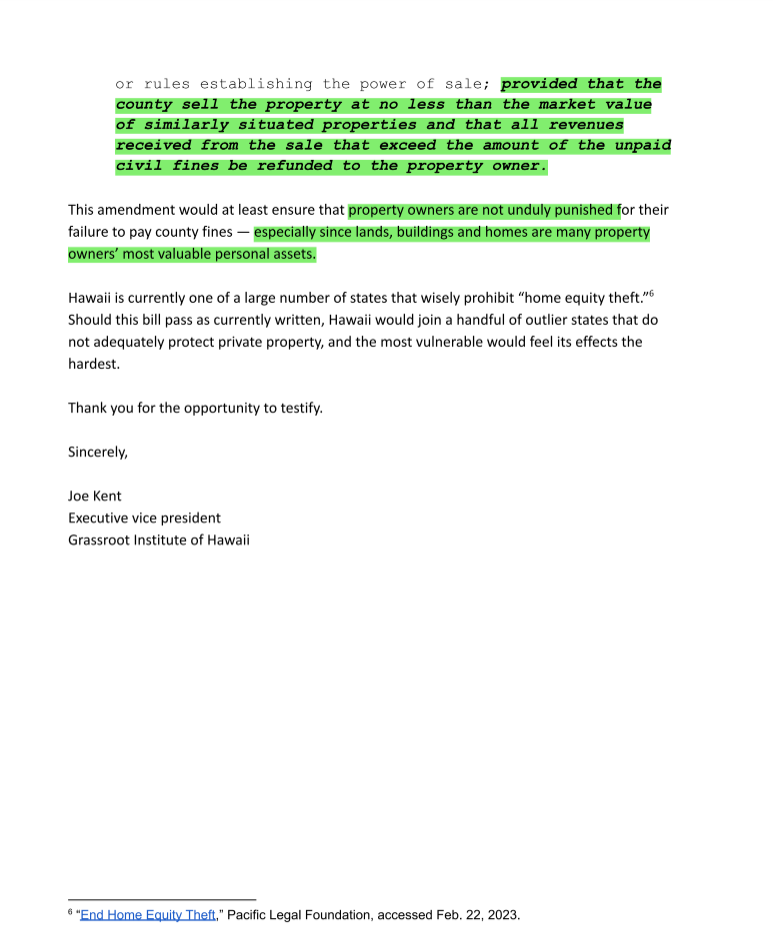
Here is another Cut and Paste Committee Report.
Below is language from the Grassroots Institute of Hawaii’s written testimony that was quickly adopted by the Senate Judicial Committee. The language is highlighted in green for quick reading. Again, other Opposition testimonies that did not fit the Legislators agenda were summarily dismissed.
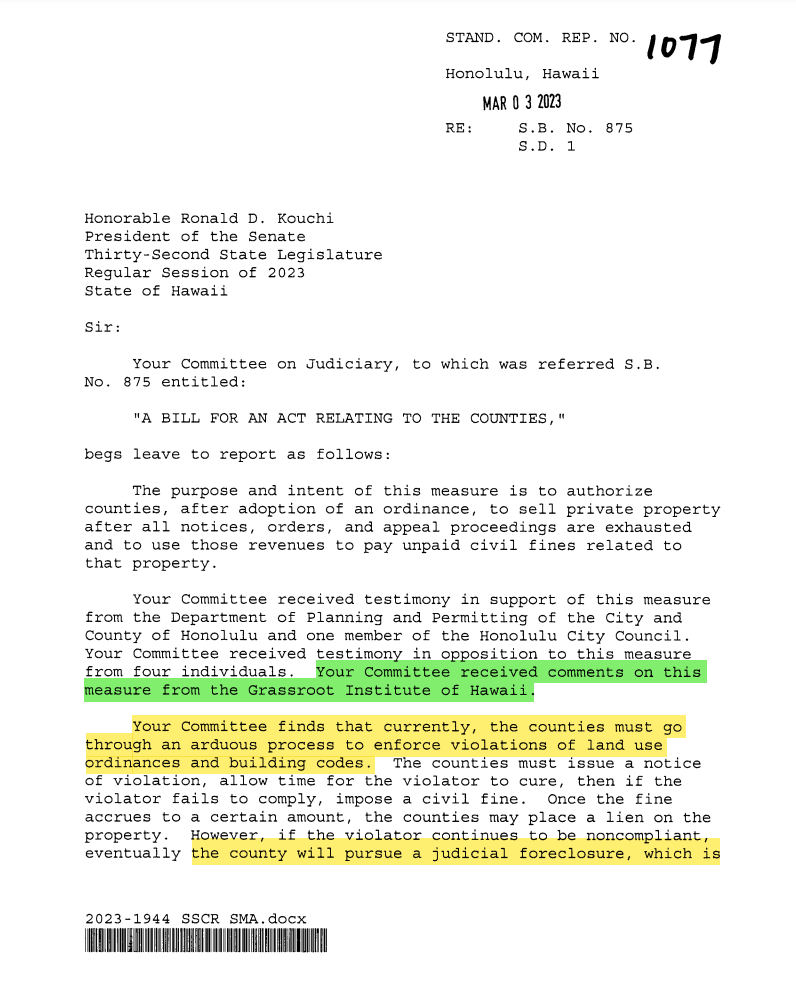
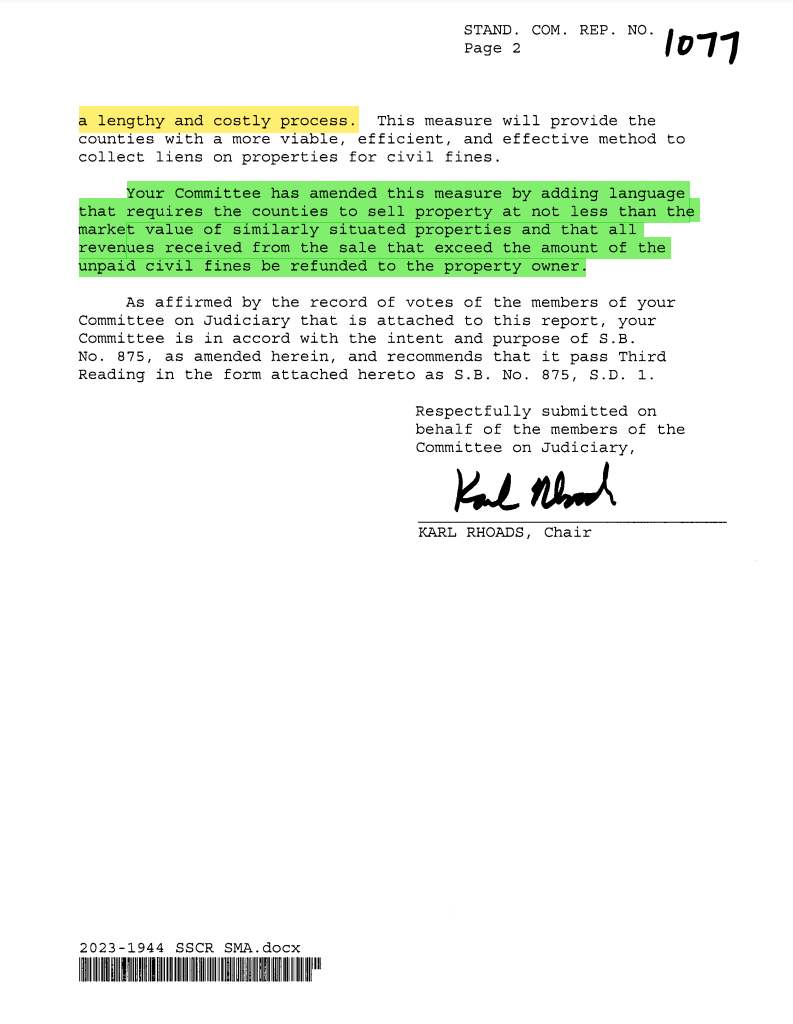
Thanks in part to the illogical rationale of the Grassroots Institute of Hawaii, SB 875, S.D.1 seems good to go!
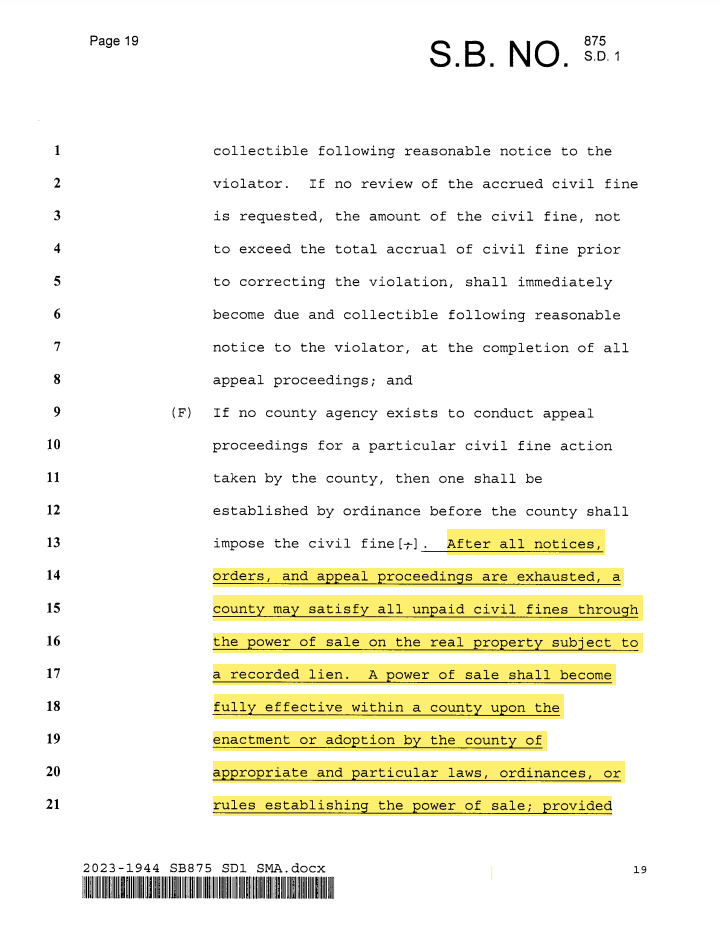
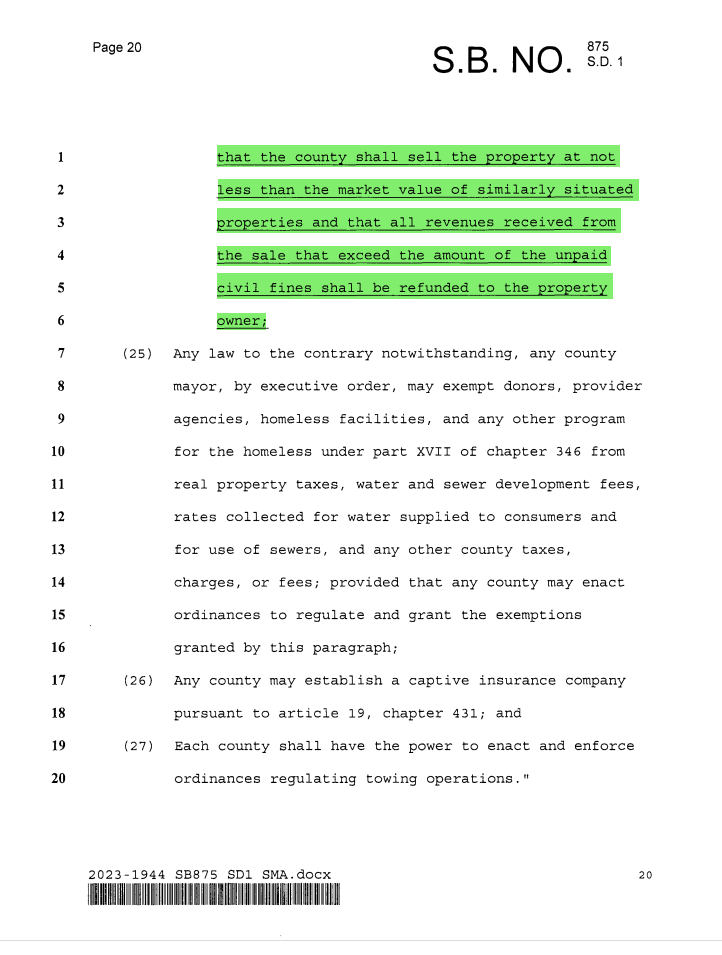
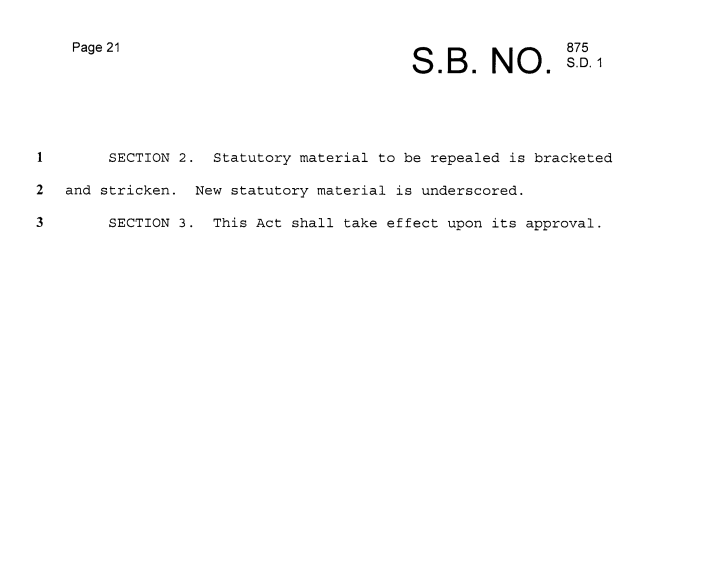
What’s next?
Kill Bill 875, HB 15, HB 538.
A relatively few property owners can be loathsome and egregious. But there is never a good reason to burn down the Cathedral of Civil Rights to fry a few bad eggs.
—Pau
